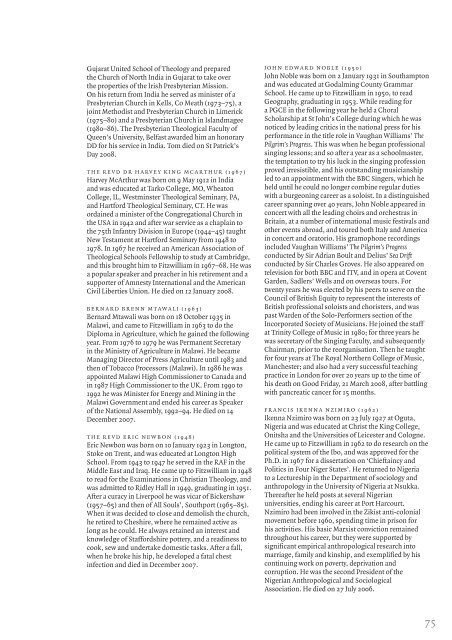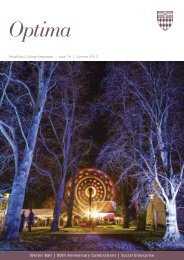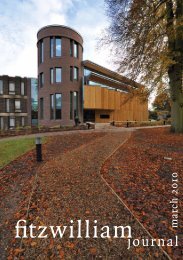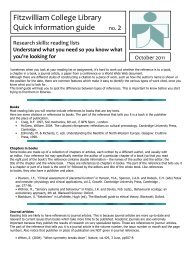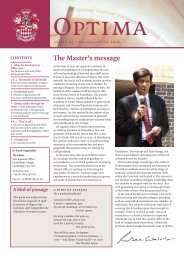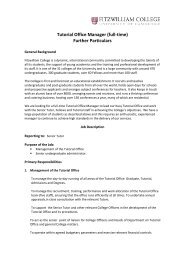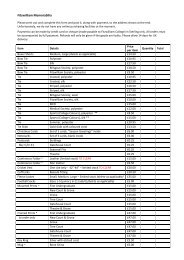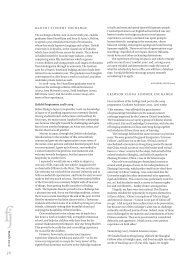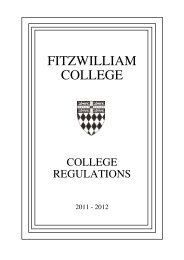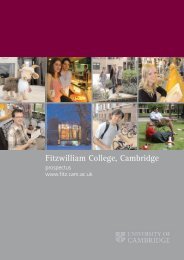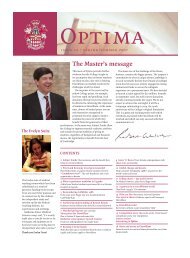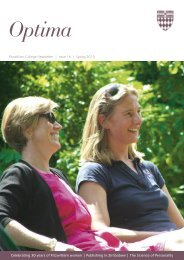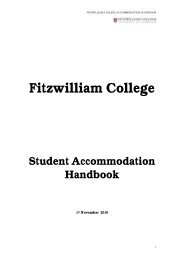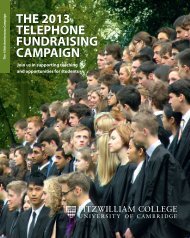march 2009 - Fitzwilliam College - University of Cambridge
march 2009 - Fitzwilliam College - University of Cambridge
march 2009 - Fitzwilliam College - University of Cambridge
Create successful ePaper yourself
Turn your PDF publications into a flip-book with our unique Google optimized e-Paper software.
Gujarat United School <strong>of</strong> Theology and prepared<br />
the Church <strong>of</strong> North India in Gujarat to take over<br />
the properties <strong>of</strong> the Irish Presbyterian Mission.<br />
On his return from India he served as minister <strong>of</strong> a<br />
Presbyterian Church in Kells, Co Meath (1973–75), a<br />
joint Methodist and Presbyterian Church in Limerick<br />
(1975–80) and a Presbyterian Church in Islandmagee<br />
(1980–86). The Presbyterian Theological Faculty <strong>of</strong><br />
Queen’s <strong>University</strong>, Belfast awarded him an honorary<br />
DD for his service in India. Tom died on St Patrick’s<br />
Day 2008.<br />
THE REVD DR HARVEY KING MCARTHUR (1967)<br />
Harvey McArthur was born on 9 May 1912 in India<br />
and was educated at Tarko <strong>College</strong>, MO, Wheaton<br />
<strong>College</strong>, IL, Westminster Theological Seminary, PA,<br />
and Hartford Theological Seminary, CT. He was<br />
ordained a minister <strong>of</strong> the Congregational Church in<br />
the USA in 1942 and after war service as a chaplain to<br />
the 75th Infantry Division in Europe (1944–45) taught<br />
New Testament at Hartford Seminary from 1948 to<br />
1978. In 1967 he received an American Association <strong>of</strong><br />
Theological Schools Fellowship to study at <strong>Cambridge</strong>,<br />
and this brought him to <strong>Fitzwilliam</strong> in 1967–68. He was<br />
a popular speaker and preacher in his retirement and a<br />
supporter <strong>of</strong> Amnesty International and the American<br />
Civil Liberties Union. He died on 12 January 2008.<br />
BERNARD BRENN MTAWALI (1963)<br />
Bernard Mtawali was born on 18 October 1935 in<br />
Malawi, and came to <strong>Fitzwilliam</strong> in 1963 to do the<br />
Diploma in Agriculture, which he gained the following<br />
year. From 1976 to 1979 he was Permanent Secretary<br />
in the Ministry <strong>of</strong> Agriculture in Malawi. He became<br />
Managing Director <strong>of</strong> Press Agriculture until 1983 and<br />
then <strong>of</strong> Tobacco Processors (Malawi). In 1986 he was<br />
appointed Malawi High Commissioner to Canada and<br />
in 1987 High Commissioner to the UK. From 1990 to<br />
1992 he was Minister for Energy and Mining in the<br />
Malawi Government and ended his career as Speaker<br />
<strong>of</strong> the National Assembly, 1992–94. He died on 14<br />
December 2007.<br />
THE REVD ERIC NEWBON (1948)<br />
Eric Newbon was born on 10 January 1923 in Longton,<br />
Stoke on Trent, and was educated at Longton High<br />
School. From 1943 to 1947 he served in the RAF in the<br />
Middle East and Iraq. He came up to <strong>Fitzwilliam</strong> in 1948<br />
to read for the Examinations in Christian Theology, and<br />
was admitted to Ridley Hall in 1949, graduating in 1951.<br />
After a curacy in Liverpool he was vicar <strong>of</strong> Bickershaw<br />
(1957–65) and then <strong>of</strong> All Souls’, Southport (1965–85).<br />
When it was decided to close and demolish the church,<br />
he retired to Cheshire, where he remained active as<br />
long as he could. He always retained an interest and<br />
knowledge <strong>of</strong> Staffordshire pottery, and a readiness to<br />
cook, sew and undertake domestic tasks. After a fall,<br />
when he broke his hip, he developed a fatal chest<br />
infection and died in December 2007.<br />
JOHN EDWARD NOBLE (1950)<br />
John Noble was born on 2 January 1931 in Southampton<br />
and was educated at Godalming County Grammar<br />
School. He came up to <strong>Fitzwilliam</strong> in 1950, to read<br />
Geography, graduating in 1953. While reading for<br />
a PGCE in the following year he held a Choral<br />
Scholarship at St John’s <strong>College</strong> during which he was<br />
noticed by leading critics in the national press for his<br />
performance in the title role in Vaughan Williams’ The<br />
Pilgrim’s Progress. This was when he began pr<strong>of</strong>essional<br />
singing lessons; and so after a year as a schoolmaster,<br />
the temptation to try his luck in the singing pr<strong>of</strong>ession<br />
proved irresistible, and his outstanding musicianship<br />
led to an appointment with the BBC Singers, which he<br />
held until he could no longer combine regular duties<br />
with a burgeoning career as a soloist. In a distinguished<br />
career spanning over 40 years, John Noble appeared in<br />
concert with all the leading choirs and orchestras in<br />
Britain, at a number <strong>of</strong> international music festivals and<br />
other events abroad, and toured both Italy and America<br />
in concert and oratorio. His gramophone recordings<br />
included Vaughan Williams’ The Pilgrim’s Progress<br />
conducted by Sir Adrian Boult and Delius’ Sea Drift<br />
conducted by Sir Charles Groves. He also appeared on<br />
television for both BBC and ITV, and in opera at Covent<br />
Garden, Sadlers’ Wells and on overseas tours. For<br />
twenty years he was elected by his peers to serve on the<br />
Council <strong>of</strong> British Equity to represent the interests <strong>of</strong><br />
British pr<strong>of</strong>essional soloists and choristers, and was<br />
past Warden <strong>of</strong> the Solo-Performers section <strong>of</strong> the<br />
Incorporated Society <strong>of</strong> Musicians. He joined the staff<br />
at Trinity <strong>College</strong> <strong>of</strong> Music in 1980; for three years he<br />
was secretary <strong>of</strong> the Singing Faculty, and subsequently<br />
Chairman, prior to the reorganisation. Then he taught<br />
for four years at The Royal Northern <strong>College</strong> <strong>of</strong> Music,<br />
Manchester; and also had a very successful teaching<br />
practice in London for over 20 years up to the time <strong>of</strong><br />
his death on Good Friday, 21 March 2008, after battling<br />
with pancreatic cancer for 15 months.<br />
FRANCIS IKENNA NZIMIRO (1962)<br />
Ikenna Nzimiro was born on 23 July 1927 at Oguta,<br />
Nigeria and was educated at Christ the King <strong>College</strong>,<br />
Onitsha and the Universities <strong>of</strong> Leicester and Cologne.<br />
He came up to <strong>Fitzwilliam</strong> in 1962 to do research on the<br />
political system <strong>of</strong> the Ibo, and was approved for the<br />
Ph.D. in 1967 for a dissertation on ‘Chieftaincy and<br />
Politics in Four Niger States’. He returned to Nigeria<br />
to a Lectureship in the Department <strong>of</strong> sociology and<br />
anthropology in the <strong>University</strong> <strong>of</strong> Nigeria at Nsukka.<br />
Thereafter he held posts at several Nigerian<br />
universities, ending his career at Port Harcourt.<br />
Nzimiro had been involved in the Zikist anti-colonial<br />
movement before 1960, spending time in prison for<br />
his activities. His basic Marxist conviction remained<br />
throughout his career, but they were supported by<br />
significant empirical anthropological research into<br />
marriage, family and kinship, and exemplified by his<br />
continuing work on poverty, deprivation and<br />
corruption. He was the second President <strong>of</strong> the<br />
Nigerian Anthropological and Sociological<br />
Association. He died on 27 July 2006.<br />
75


